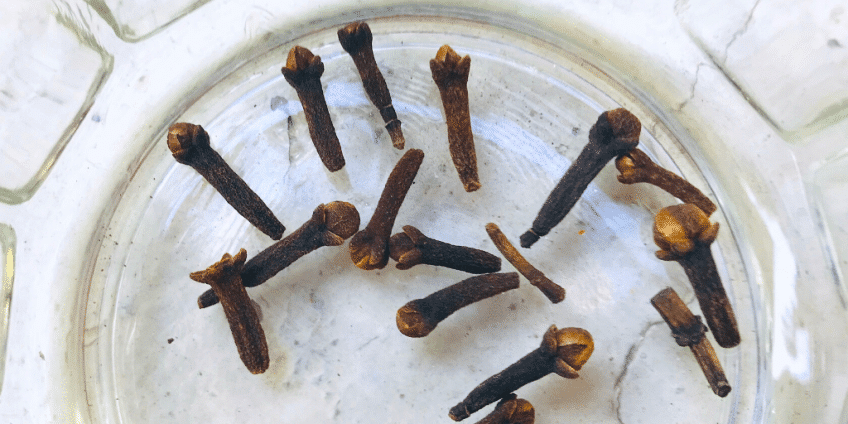Scroll to Recipes with Clove / लौंग as ingredient
Clove is a dried flower bud of a Myrtaceae tree. Syzygium aromaticum is another name for cloves.
In places like Indonesia, Madagascar, Zanzibar, Pakistan, and Sri Lanka, they harvest of cloves. Moreover, Indonesia produces almost 80% of the world’s clove, followed by Madagascar and Tanzania.
Asian, African, Mediterranean, and therefore the Near and Middle East countries use cloves in cuisines, lending flavor to meats, curries, and marinades, also as fruit like apples, pears or rhubarb.
Indonesians use clove commercially, to make a type of cigarette called kretek. In medical terms, the traditional use of cloves is an essential oil. The primary purpose of the essential oil was to treat dental disorders, but people use it in aromatherapy too.
Moreover, the traditional appliance of the clove was for minor healing cuts. Clove tea is a popular beverage to get relief from congestion. Furthermore, it is also used as a bug and insect repellant due to its strong aroma.
Common Names for Clove
There are different names for cloves in different languages.
| Language | Name | Written as |
|---|---|---|
| Bengali | Labaṅga | লবঙ্গ |
| Gujarati | Laviṅga | લવિંગ |
| Hindi | laung | लौंग |
| Kannada | Lavaṅga | ಲವಂಗ |
| Malayalam | grāmpū | ഗ്രാമ്പൂ |
| Marathi | Lavaṅga | लवंग |
| Tamil | Kirāmpu | கிராம்பு |
| Telugu | Lavaṅgaṁ | లవంగం |
| Urdu | laung | لونگ |
| Sanskrit | lavaGga | लवङ्ग |
Nutritional Profile of Clove
Nutritional profile per 100 gms
- Calories: 274
- Protein: 6g
- Carbohydrate: 66g
- Fiber: 34g
- Fat: 4g
- Sodium: 277mg
- Potassium: 1.02mg
Source: USDA & Google
Health Benefits of clove
Clove has many benefits to offer, including aiding in digestion, boosting the immune system, and controlling diabetes.
Oral health
Clove oil is beneficial in dental disorders. Many mouth wash or toothpaste includes cloves as an agent.
Source: www.medicalnewstoday.com
High Antioxidants
Antioxidants reduce stress, which is a major contributor to chronic disease. Since cloves also contain a compound called eugenol, which has been shown to act as a natural antioxidant.
Source: www.ncbi.nlm.nih.gov
May Protect Against Cancer
A study found that clove extract helped stop the growth of tumors and promoted cell death in cancer cells. So it may help prevent cancer.
Source: ncbi.nlm.nih.gov
Antibacterial
Cloves have antimicrobial properties, which means they can help stop the growth of microorganisms like bacteria. One study showed that clove essential oil was effective at killing off three common types of bacteria, including E. coli.
Source: ncbi.nlm.nih.gov
Diabetes
It is found during a study that clove extract and nigericin, a component of clove extract, reduced insulin resistance within the muscle cells.
Source: ncbi.nlm.nih.gov
Cam Cure Stomach Ulcers
Some animal studies show the oil extract from the clove can increase the production of gastric mucus and help protect against stomach ulcers.
Source: ncbi.nlm.nih.gov
Side effects of Clove
Sometimes consumption of cloves can cause hives, difficulty in breathing, and your face, lips, tongue, or throat to swell up.
One should not use clove if they are suffering from severe burning, redness, pain, or swelling after use on the skin.
Liver problems, itching, rash, mild skin irritation, sore gums, mouth irritation, bleeding or swollen gums, or tooth changes may occur after using clove.
Source: drugs.com
Frequently Asked Questions
What cloves are good for?
Cloves have several benefits. They are antioxidants, may protect against cancer, contain essential nutrients, may improve liver health, may help regulate blood sugar, may reduce stomach ulcers.
Source: drugs.com
Is it safe to eat cloves?
Clove is probably safe for many people when taken orally in amounts commonly found in food.
What are the side effects of cloves?
Side effects of consuming clove in large quantities are mild skin irritation, itching, or sore gums. One can also have mouth irritation, bleeding, or swollen gums.
Source: verywellhealth.com
What are cloves used for in medicine?
Cloves are majorly used for curing dental disorders. Other than that, clove oil is used for diarrhea, hernia, and bad breath. It is also used for intestinal gas, nausea, and vomiting and for a complication of tooth extraction called “dry socket.”
Source: PubMed Central
What are the benefits of clove tea?
Clove tea can help you regulate your hunger levels, can keep your blood sugar levels in check, have antibacterial properties, help with inflammation; you can use them as a natural cleaner.
Source: organicfacts.net
Is Clove suitable for gas?
Cloves may be helpful in digestion and help in better functioning of the digestive system. Besides, clove tea improves the digestive system by attacking bacteria.
Source: lifealth.com
Is Clove good for cough?
Chewing cloves with common salt helps with the expectoration- ejecting mucus from lungs or throat by spitting or coughing. Eating a burnt clove is also an effective way of treating cough.
Source: thehealthsite.com
Can you put clove oil directly on the skin?
You can directly apply clove oil on the acne or can mix it with your cream, but not when you have sensitive skin. You can use clove essential oil with a pinch of turmeric for a patch treatment.
Is Clove a preservative?
Cloves are used as a preservative since centuries to preserve food. Because of cloves high in antimicrobial, antifungal, antioxidant, and antilarval properties, they are suitable for preservation.
Source: enotes.com
Do cloves help you sleep?
Clove oil is remedial to induce sleep. Applying salt mixed with four drops of clove helps sleep.

